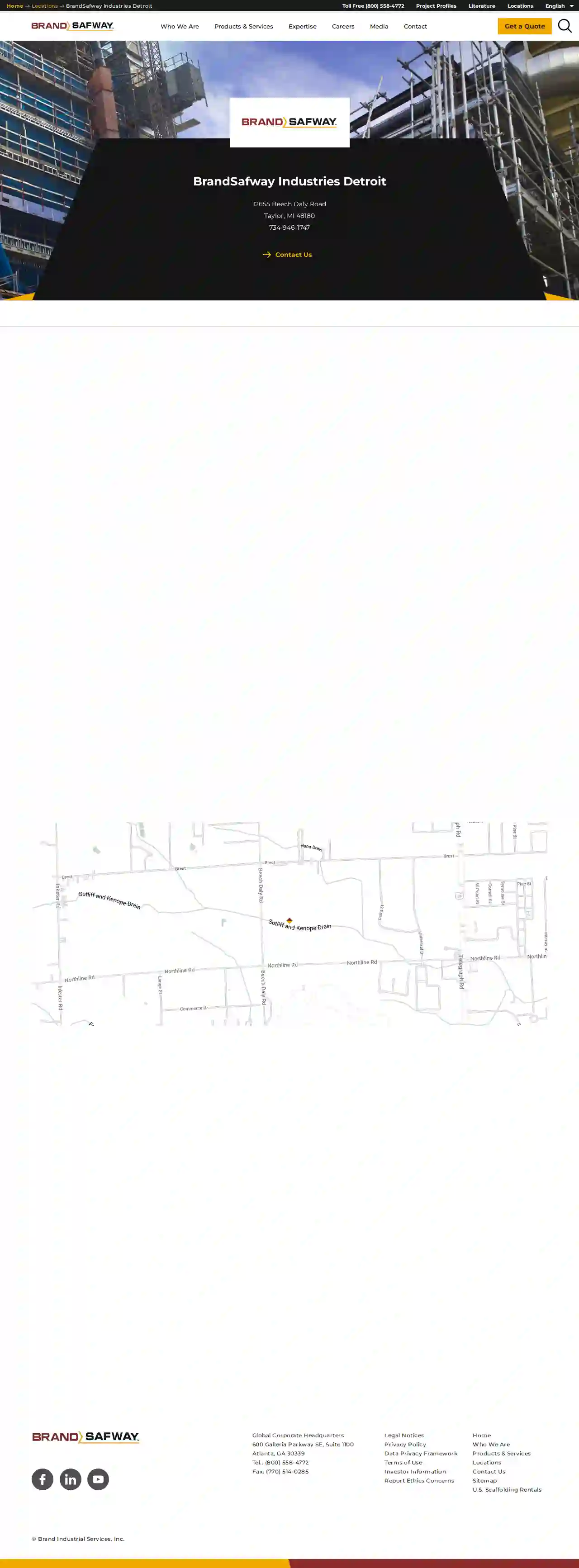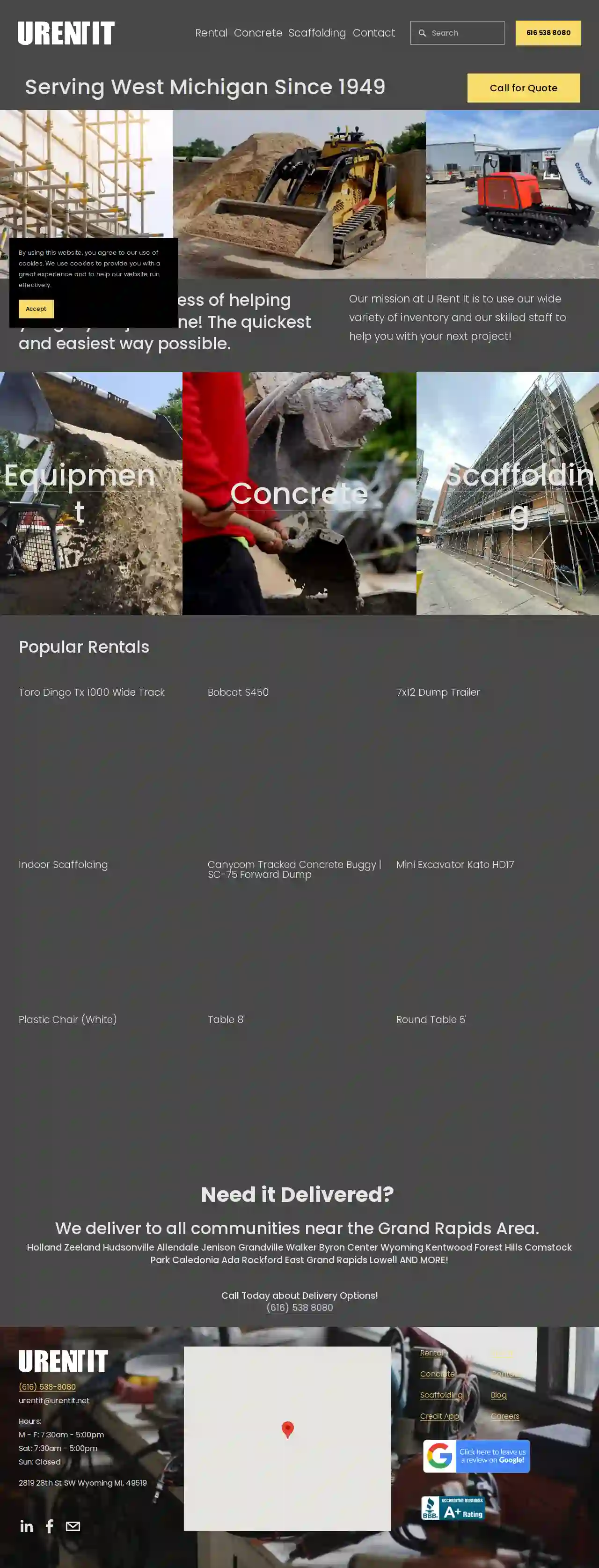Scaffolding Companies Byron Center
Find the best Scaffolding Solutions in Byron Center
Receive multiple Scaffolding Specialists quotes for your project today! Compare profiles, reviews, accreditations, portfolio, etc... and choose the best offer.

Swing-Lo Suspended Scaffold Co
46 reviewsP.O. Box 1287, 75609 CR 376, Covert, MI, 49043, USFaster, safer & more economical. Swing-Lo Suspended Scaffold is a one-stop destination for your suspended scaffolding. A company where safety is paramount, we pride ourselves on our over fifty-five-year history of supplying safe and durable suspended scaffolding worldwide. Our approach: The invention and introduction of Swing-Lo Suspended Scaffolds stemmed from the old adage, "necessity is the mother of invention". That was the motivation behind the invention of Swing-Lo Suspended Scaffolds by H. George Leonard, a painting contractor whose bid was below his competitors. The idea was derived from the old ice tong and a pair of scissors. The combination of both items provided him with a model that would scissor and grip the bottom flanges of I-beams on bridges. This model, along with a connecting hanger component produced a simple suspended scaffold that could be easily erected and dismantled. The application and performance of this scaffold was well received, and soon became a demand by bridge and painting contractors. Thus, the painter became the manufacturer of a particular type of scaffold whose market has expanded from local to national to international. Constant improvements in the design and fabrication of Swing-Lo Suspended Scaffolds have served to provide a safer, more efficient and economical scaffolding system for highway and utility contractors when access to work areas are a problem. Swing-Lo Suspended Scaffolds are patented with built-in, quick locking devices and fasteners for instant assembly. They have lessened the risks to the worker, lowered the cost, and increased safety in modern bridge and power plant construction and maintenance.
- Services
- Why Us?
- Accreditations
- Gallery
Get Quote
Fraco USA, Inc.
51 reviews91, chemin des Patriotes, St-Mathias-sur-Richelieu, J3L 1T5, USFraco is a company committed to providing innovative and state-of-the-art vertical transportation equipment and solutions for the construction industry. With over 30 years of experience, we have been anticipating the access system needs of the construction industry. Our custom solutions ensure the safety and productivity of workers on construction sites around the world. We offer a range of products, including elevators, construction hoists, transport platforms, and permanent industrial elevators, as well as associated products and accessories.
- Services
- Why Us?
- Accreditations
- Gallery
Get Quote
BrandSafway Industries Detroit
3.25 reviews123 Main St, Detroit, 48201, USBrandSafway is a leading provider of access and scaffolding solutions in Detroit, Michigan. With a strong commitment to safety and customer satisfaction, we offer a wide range of services to support various industries, including construction, energy, and manufacturing. Our team of experts is dedicated to delivering high-quality solutions that meet the unique needs of each project. From scaffolding and hoisting to shoring and forming, we have the expertise and equipment to ensure your project is completed safely and efficiently.
- Services
- Why Us?
- Accreditations
- Our Team
- Testimonials
Get Quote
National Ladder & Scaffold Co
4.539 reviews1234 Industrial Drive, Kentwood, 49512, USNational Ladder & Scaffold Co. is a leading provider of ladder and scaffolding solutions, offering a wide range of products and services to meet the needs of various industries. With a strong commitment to safety, quality, and customer satisfaction, the company strives to provide innovative solutions that enhance productivity and efficiency. Their team of experienced professionals ensures that clients receive top-notch service and support.
- Services
- Why Us?
- Accreditations
- Our Team
- Testimonials
Get Quote
U Rent It / Scaffolding Systems Inc.
4.981 reviews2819 28th St. SW, Wyoming, MI, 49519, USU Rent It is a leading equipment rental company in West Michigan, dedicated to providing a wide variety of inventory and skilled staff to help with your next project. With a mission to make your job easier and quicker, U Rent It offers equipment rentals including concrete, scaffolding, and popular items like indoor scaffolding, air compressors, and excavators. They also provide delivery options to all communities near the Grand Rapids Area. U Rent It is committed to customer satisfaction and offers a credit application for those interested.
- Services
- Why Us?
- Accreditations
- Our Team
- Testimonials
- Gallery
Get Quote
Scaffolding Systems Inc
2819 28th St. SW, Wyoming, MI, 49519, USU Rent It is a family-owned business that has been serving West Michigan since 1949. Our mission is to provide a wide variety of inventory and skilled staff to help you with your next project. We offer equipment rentals for concrete, scaffolding, and more, with delivery options available to all communities near the Grand Rapids Area.
- Services
- Why Us?
- Gallery
Get Quote- To
Tool & Truck Rental at The Home Depot
428 reviewsDetroit, US- Services
- Why Us?
Get Quote - At
At Home
4.3963 reviewsKalamazoo, US- Services
- Why Us?
Get Quote - Un
United Rentals
4.637 reviewsGrand Rapids, US- Services
- Why Us?
Get Quote - CL
CLINK
4.817 reviewsDetroit, US- Services
- Why Us?
Get Quote
Over 2,353+ Scaffolding Companies in our network
Our scaffolding contractors operate in Byron Center and beyond!
ScaffoldingHQ has curated and vetted the Best Scaffolding Contractors in Byron Center. Find a reliable pro today.
Frequently Asked Questions About Scaffolding Companies
- Traditional and highly versatile.
- Components (tubes, clamps, boards) are assembled on-site.
- Adaptable to complex shapes and structures.
- Requires skilled labor and more time for erection.
- Pre-engineered, modular components.
- Faster and easier to erect.
- Often has higher load capacities.
- May be less versatile for complex shapes.
- A larger, more complex structure typically used for accessing multiple levels of a building.
- Offers greater height and versatility.
- Often used for construction, renovation, and maintenance.
- Smaller, portable platforms usually used for tasks at a single level.
- Commonly used for painting, plastering, or light repairs.
- Can be rolling or stationary.
- Work at Height Regulations 2005: Covers all work at height and outlines the need for risk assessments, competent erectors, and safe equipment.
- Construction (Design and Management) Regulations 2015 (CDM): Applies to construction projects and requires planning for scaffolding safety throughout the project lifecycle.
- British Standard BS EN 12811: Sets standards for the design, manufacture, and testing of scaffolding components.
- NASC (National Access & Scaffolding Confederation) Guidance: Provides industry best practices and safety recommendations for scaffolding.
- Regulations: Local regulations often specify minimum inspection intervals.
- Project Type and Duration: Long-term projects or those in challenging environments may require more frequent inspections.
- Weather Conditions: Severe weather (storms, high winds) can necessitate additional inspections.
- Any Alterations or Modifications: Any changes to the scaffolding structure require re-inspection.
What is the difference between tube and clamp scaffolding and system scaffolding?
Tube and Clamp Scaffolding:
What is the difference between scaffolding and staging?
Scaffolding:
What are the safety regulations for scaffolding in the USA?
How often should scaffolding be inspected?
What is the difference between tube and clamp scaffolding and system scaffolding?
Tube and Clamp Scaffolding:
- Traditional and highly versatile.
- Components (tubes, clamps, boards) are assembled on-site.
- Adaptable to complex shapes and structures.
- Requires skilled labor and more time for erection.
- Pre-engineered, modular components.
- Faster and easier to erect.
- Often has higher load capacities.
- May be less versatile for complex shapes.
What is the difference between scaffolding and staging?
Scaffolding:
- A larger, more complex structure typically used for accessing multiple levels of a building.
- Offers greater height and versatility.
- Often used for construction, renovation, and maintenance.
- Smaller, portable platforms usually used for tasks at a single level.
- Commonly used for painting, plastering, or light repairs.
- Can be rolling or stationary.
What are the safety regulations for scaffolding in the USA?
- Work at Height Regulations 2005: Covers all work at height and outlines the need for risk assessments, competent erectors, and safe equipment.
- Construction (Design and Management) Regulations 2015 (CDM): Applies to construction projects and requires planning for scaffolding safety throughout the project lifecycle.
- British Standard BS EN 12811: Sets standards for the design, manufacture, and testing of scaffolding components.
- NASC (National Access & Scaffolding Confederation) Guidance: Provides industry best practices and safety recommendations for scaffolding.
How often should scaffolding be inspected?
- Regulations: Local regulations often specify minimum inspection intervals.
- Project Type and Duration: Long-term projects or those in challenging environments may require more frequent inspections.
- Weather Conditions: Severe weather (storms, high winds) can necessitate additional inspections.
- Any Alterations or Modifications: Any changes to the scaffolding structure require re-inspection.